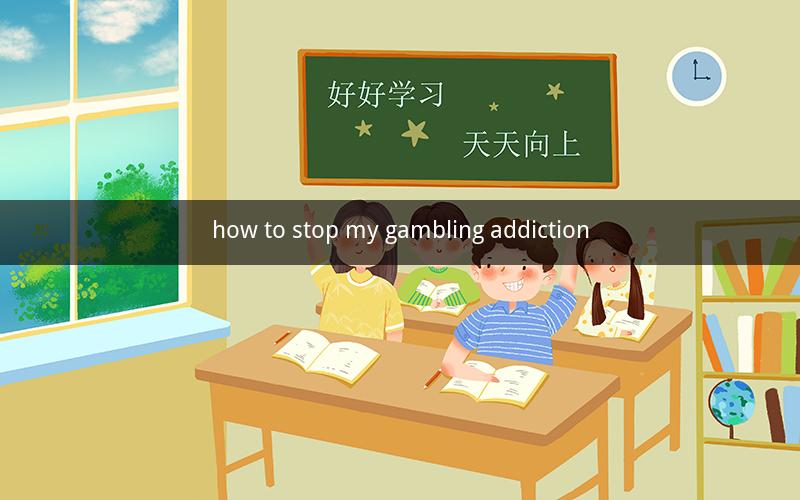
How to Stop My Gambling Addiction: A Comprehensive Guide
Table of Contents
1. Understanding Gambling Addiction
2. The Signs and Symptoms of a Gambling Problem
3. The Psychological Impact of Gambling Addiction
4. The Physical Consequences of Gambling Addiction
5. Identifying Triggers and High-Risk Situations
6. Seeking Professional Help
7. Building a Support System
8. Developing Healthy Coping Mechanisms
9. Financial Management and Budgeting
10. Relapse Prevention Strategies
1. Understanding Gambling Addiction
Gambling addiction, also known as problem gambling or pathological gambling, is a progressive and chronic condition characterized by an inability to control the urge to gamble. It is often accompanied by an emotional and psychological dependency on the act of gambling, despite the negative consequences it may have on one's life.
2. The Signs and Symptoms of a Gambling Problem
Identifying the signs and symptoms of a gambling problem is crucial in addressing the addiction. Common indicators include:
- Continual desire to gamble, often leading to preoccupation with thoughts of gambling.
- Repeated unsuccessful efforts to stop or control gambling.
- Lying to family, friends, or therapists about the extent of gambling activities.
- Risking or losing substantial amounts of money, property, or other valuables.
- Needing to gamble with increasing amounts of money to achieve the desired excitement.
- Chasing losses, attempting to recoup past gambling losses.
- Neglecting responsibilities at work, school, or home due to gambling.
- Engaging in illegal activities to finance gambling.
- Feeling restless or irritable when attempting to stop gambling.
3. The Psychological Impact of Gambling Addiction
Gambling addiction can have severe psychological consequences, including:
- Depression and anxiety
- Guilt and shame
- Feelings of hopelessness and despair
- Relationship problems
- Suicidal thoughts and behaviors
4. The Physical Consequences of Gambling Addiction
The physical effects of gambling addiction can be detrimental, including:
- Sleep disturbances
- Headaches and migraines
- Stomach problems
- Muscle tension
- Increased heart rate and blood pressure
5. Identifying Triggers and High-Risk Situations
Recognizing triggers and high-risk situations is essential in preventing relapse. Common triggers include:
- Financial strain
- Stressful life events
- Social pressure
- Access to gambling venues
6. Seeking Professional Help
Seeking professional help is a crucial step in overcoming gambling addiction. Therapies such as cognitive-behavioral therapy (CBT) and motivational interviewing (MI) have been proven effective in treating gambling addiction.
7. Building a Support System
Surrounding oneself with a supportive network can significantly aid in recovery. This may include:
- Family and friends who are understanding and supportive
- Support groups such as Gamblers Anonymous
- Therapists and counselors specializing in gambling addiction
8. Developing Healthy Coping Mechanisms
Finding healthy coping mechanisms is essential to replace the negative behaviors associated with gambling. Examples include:
- Engaging in physical activities
- Practicing mindfulness and meditation
- Pursuing hobbies and interests
- Participating in social activities
9. Financial Management and Budgeting
Addressing the financial aspect of gambling addiction is crucial. Strategies include:
- Creating a budget and sticking to it
- Seeking financial counseling or advice
- Selling off unnecessary assets to pay off debts
- Setting strict limits on spending
10. Relapse Prevention Strategies
Relapse is a common occurrence in the recovery process. To prevent relapse, consider:
- Identifying early warning signs of relapse
- Developing a relapse prevention plan
- Seeking support during vulnerable times
- Remaining vigilant about triggers and high-risk situations
Questions and Answers
1. Q: How can I recognize if I have a gambling addiction?
A: Look for signs such as preoccupation with gambling, lying about gambling activities, and negative consequences in your life due to gambling.
2. Q: What are some effective treatments for gambling addiction?
A: Cognitive-behavioral therapy (CBT) and motivational interviewing (MI) are proven effective treatments for gambling addiction.
3. Q: Can I overcome a gambling addiction on my own?
A: While it is possible to overcome gambling addiction independently, seeking professional help and support can significantly improve the chances of successful recovery.
4. Q: How can I manage the financial consequences of gambling addiction?
A: Seek financial counseling, create a budget, and sell off unnecessary assets to pay off debts.
5. Q: Are there any medications that can help treat gambling addiction?
A: Currently, there are no medications specifically designed to treat gambling addiction. Therapy and support groups are more commonly used.
6. Q: Can I join a support group even if I'm not ready to stop gambling?
A: Yes, joining a support group can be beneficial at any stage of recovery, including if you are not yet ready to stop gambling.
7. Q: How long does it take to recover from a gambling addiction?
A: Recovery from gambling addiction is a lifelong process. While some individuals may experience relief within a few months, others may require ongoing support and therapy for years.
8. Q: Can a person with a gambling addiction ever gamble again?
A: Recovery from gambling addiction involves learning to live with the risk of relapse. It is possible for individuals to gamble again, but they must be cautious and aware of their triggers and vulnerabilities.
9. Q: How can I help a loved one with a gambling addiction?
A: Offer support, encourage them to seek professional help, and be patient. It's important to set boundaries and protect yourself from the negative consequences of their addiction.
10. Q: What are some signs of a relapse in gambling addiction?
A: Signs of relapse include a return to gambling behaviors, increased financial strain, and negative consequences in various aspects of life.